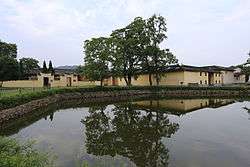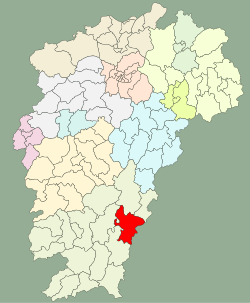Ruijin
Ruijin (Chinese: 瑞金; pinyin: Ruìjīn) is a county-level city of Ganzhou in the mountains bordering Fujian Province in the south-eastern part of Jiangxi Province.
Ruijin 瑞金市 | |
|---|---|
County-level & Sub-prefectural city | |
 Ruijin | |
 Location in Jiangxi | |
| Coordinates: 25°53′10″N 116°01′37″E | |
| Country | People's Republic of China |
| Province | Jiangxi |
| Prefecture-level city | Ganzhou |
| Postal Code | 342500 |
| Ruijin | |||||||||
|---|---|---|---|---|---|---|---|---|---|
| Chinese | 瑞金 | ||||||||
| Postal | Juikin | ||||||||
| |||||||||
It is most famous as one of the earliest centers of Chinese communist activity. After being forced out of Jinggangshan in the late 1920s by the Kuomintang, the Communists fled here, taking advantage of Ruijin's relative isolation in the rugged mountains along Jiangxi's border with Fujian. In 1931, under Mao Zedong's leadership, the Chinese Soviet Republic was established here, with Ruijin serving as its de facto capital. By 1934, they had again been surrounded by Chiang Kai-shek's forces. It is from here that the famed "Long March" began.
Ruijin is a popular destination for red tourism and ecotourism. It is a pilgrimage for Maoists from China and around the globe.
Transport
- Ganzhou–Longyan Railway
On 22 May 2016 the BBC reported that four cars fell into a sinkhole in Ruijin City.[1]